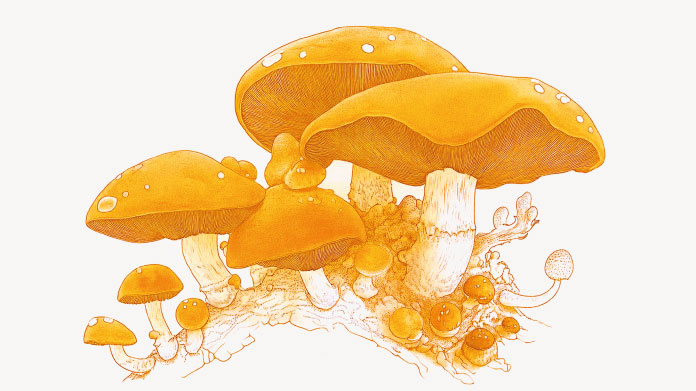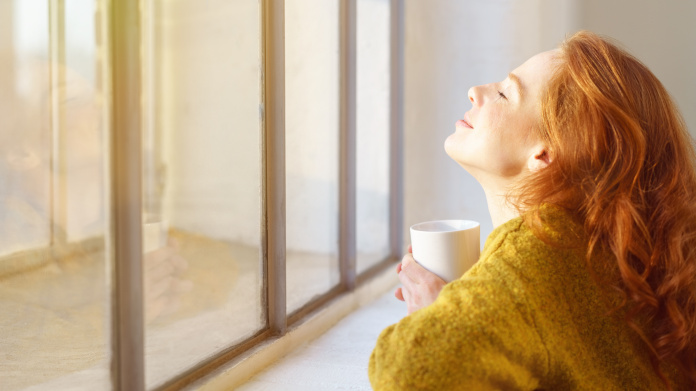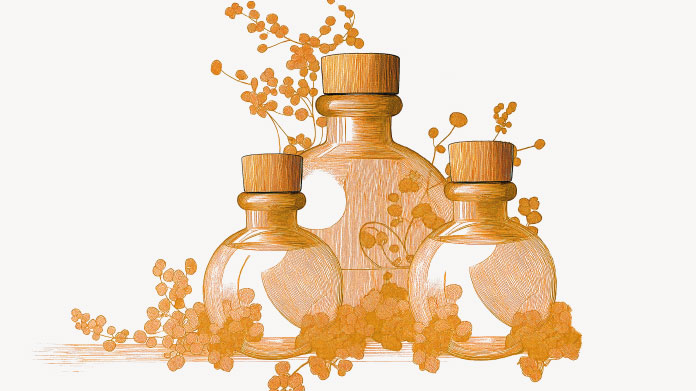Lockdown: interview with naturopath Lisa Salis
SuperSmart interviewed Lisa Salis, an expert in naturopathy and nutrition. Using video-conferencing, the qualified therapist offered her advice on how to get through this period and, quite simply, how to live better.

Turn on sub-titles or read the written transcription below the video
SUPERSMART: For several months now, coronavirus (COVID 19) has been dominating our lives. Alongside essential ‘barrier’ measures (social distancing, rigorous hand-washing …), what advice can you give our readers on how to avoid becoming infected?
LISA SALIS : Wearing a face mask is the best prevention. I was lucky enough to buy a really good mask when I spent three months in Indonesia. The pollution there is terrible so I wore it every time I went out shopping. There are numerous on-line tutorials that show you how to make them at home if you need help.
The next step is to follow the lockdown advice and only go out when it’s absolutely necessary. You therefore need to be a bit organised when it comes to food shopping. Eat perishable foods first and keep other foods and frozen products for later.
Can you tell us more about the idea of ‘immunity’?
L.S. : The immune system is comprised of cells, tissues, mucous membranes and organs which allow the body to defend itself against all kinds of pathogens : viruses, bacteria, fungal growth and proliferation in general, anything which might trigger an immune response.
We have two types of immune response:
First, there’s the innate immune response: this comes into play during the first hours and days of an infection. The role of innate immunity is to stop the pathogen from spreading using physical barriers such as the skin, mucous membranes, eye lashes, skin appendages and in particular, mucus. This is rich in anti-microbial substances which need vitamin D in order to be efficient; that’s why exposing our skin to the sun and taking a supplement in winter are so important. When this type of innate immunity is activated, it triggers inflammation. The affected area becomes red and swollen (like our noses at the start of a cold) and we may develop a temperature.
Then we have the adaptive (or acquired) immune response: this becomes more effective through experience – further encounters with a known pathogen. The lymphocytes located in our lymph glands develop an immunological memory of a pathogen when they first encounter it, which enables them to respond faster the next time they meet it.
Lastly, I’d add that immunity is also about identity since it allows us to discriminate between self and non-self (foreign).
We are also engaged, through our dietary supplements and blog articles, in helping those who follow us boost their immune systems. What, for you, are the essential rules to follow here?
L.S. : In order for the two types of immune response to function effectively, the body needs certain hormones and nutrients:
In terms of hormones, it’s particularly those secreted by the thyroid (T4/T3) and DHEA secreted by the adrenal glands. The latter tends to decrease with age which is why our immunity may also become weaker as we grow older. To ensure good hormone status, effective stress management and restorative sleep are extremely important.
As for nutrients, vitamins A, B, C, D, and E, as well as zinc, iodine, iron, magnesium, and selenium are all essential … For hormone production, it’s important to have an adequate intake of amino acids and fatty acids, I’m thinking in particular of tyrosine for thyroid balance and of cholesterol, without which hormone production is impossible. In all cases, we need to remember that nutritional synergy has a more positive effect than any single molecule taken on its own, however effective.
Last but not least, it will come as no surprise to anyone that the quality of our immunity depends to a large extent on that of our intestinal ecosystem, ie, our intestinal mucosa and the balance of our microbiota.
Looking after your gut flora means eating a healthy, anti-inflammatory diet, and remembering to chew your food properly! If you could only retain three essential cornerstones, I’d recommend focusing on eating food that’s 100% natural, and ensuring a good intake of both antioxidants (red fruits and berries, turmeric, goji berries, chaga, brightly-coloured food in general) and omega 3 fatty acids (ground flaxseed, hemp seed for ALA and small oily fish for EPA/DHA).
In short, boosting your immunity requires:
- good stress management
- getting enough sleep and rest
- a healthy diet rich in micronutrients (vitamins, antioxidants, minerals, trace elements).
What do you recommend diet-wise?
L.S. : First and foremost, it’s important to restrict your consumption of sugar, salt and refined cereals, as refined products have a demineralising effect and lead to a loss of calcium and magnesium in particular. And these minerals are essential for a healthy immune system and energy production (ATP).
Secondly, our immune defences may be up to 75% less effective when blood sugar levels are elevated.
So out with the white sugar, white bread, sliced bread, sugary products, white pasta and rice, and especially: ultra-processed foods. Replace them with wholegrain cereals or pseudo-cereals such as quinoa (home-grown is more eco-friendly), buckwheat, small spelt, oatmeal, barley, brown rice and whole wheat pasta, but choose organic varieties to avoid any pesticide residues left on the husks.
Finally, I’d recommend filling half your plate with raw or lightly-steamed vegetables to make sure you stock up on your vitamins. Dried seaweed and wheatgerm are also good to add for their nutrient content.
To make it easier, here are some key foods to include that will ensure you get enough essential nutrients:
- eggs (organic or free-range), as the yolk provides vitamin A and selenium, and the white is rich in valuable amino acids;
- raw peppers and parsley: excellent sources of vitamin C;
- seaweed: a natural multivitamin par excellence! You don’t need to worry about consuming too much iodine as long you eat it in its dried form. Seaweed is also packed with calcium, iron and magnesium;
- oilseeds: a source of vitamin A, calcium, magnesium, selenium and amino acids;
- wheatgerm: like seaweed, this is a nutritional powerhouse which helps prevent common deficiencies in B vitamins and zinc in particular. Wheatgrass or barley grass juices are also very effective;
- lacto-fermented foods that you find in organic shops: sauerkraut, miso, fruit kefir, etc. They must be unpasteurised to be effective. They provide probiotics and help support a balanced microbiota.
Are there any natural immunostimulants that you’d particularly recommend?
L.S. : Yes, there are indeed natural substances that boost immunity.
In particular:
- vitamin C (1 g/day) ;
- vitamin D3 (75 IU/per kg of weight a day) ;
- quercetin ;
- cat’s claw (Uncaria tomentosa) ;
- AHCC (Active Hexose Correlated Compound) found in medicinal mushrooms.
Do you have any specific advice for this lockdown period?
L.S. : The current lockdown is the perfect opportunity to refocus on the essential. I believe it’s time to think about everything we can do to improve our lives and our impact on the planet.
In terms of our lives, we can take stock of what we love and of all the activities that motivate us, so that we can make more time for them in the future. We’re nourished by more than what’s on our plate. Our relationships, our passions, our hobbies, our professional development, our spiritual growth – all these elements are just as nourishing as our food. I always ask those seeking my advice to carry out this exercise in order to steer them towards a life that’s more suited to them, one that will bring them more joy on a daily basis.
But of course there’s no point being happy in a world that’s in terminal decline. So now’s the time to list all the things you can do to live a more environmentally-friendly life. If you want to go further, I’ve written a complete article on the ecological challenges we face.
Again, which plants or nutrients would you recommend to our readers to help them stay healthy and deal with stress during this lockdown period?
L.S. : To balance the adrenal glands and help the body cope with the effects of stress, I’d recommend in particular ashwagandha, an excellent adaptogenic plant which supports the nervous system and improves our response to stress. Again, combine it with magnesium, because deficiency in magnesium is synonymous with increased sensitivity to stress.
Essential oil of ravintsara (Cinnamomum camphora L.) is extremely effective at boosting immunity and very well-tolerated. There are certain people who shouldn’t take it – asthmatics, epileptics, women in the first trimester of pregnancy and babies under three months. Apart from these contraindications, I’d advise mixing 3g with 3g of a vegetable oil of your choice and massaging it into your chest 3 times a day.
This essential oil is also interesting as in traditional Chinese medicine it carries the energy of metal. This element is associated in TCM with the energy of the large intestine and the lungs. It acts specifically on the notion of immunity by helping the body to cut itself off. This image of metal cutting is representative of its effects on our ability to place boundaries between ourselves and our environment; whether in the context of a relationship or when faced with pathogenic elements.
(Before using any essential oil, always apply a drop to your elbow crease to make sure it doesn’t cause any redness over the next few hours.)
Aside from this particular period, which are the most common problems or deficiencies in those who come for consultations with you?
L.S. : Deficiency in iron, zinc, vitamin D, magnesium, and iodine are all common. And yet without them, our immunity breaks down!
That said, you need to be careful as many supplements contain iron. Supplementing with iron when you don’t need to can have a pro-oxidant effect.
You should ALWAYS have a blood test to check for deficiency or anaemia before starting to take iron supplements.
What signs does a naturopath look for in identifying the causes of potential imbalances affecting an individual?
L.S. : A naturopath will carry out a vitality assessment. Using various observations and a lengthy questionnaire, he or she can evaluate a patient’s history and current state of health. This will be influenced by their constitution (or profile), as well as their lifestyle and potential toxic load.
Background, symptoms, history and recent blood tests enable the naturopath to get a better understanding of the potential cause of the patient’s problems.
That said, while the naturopath may be interested more in the causes of a problem than the symptoms, his or her primary aim is to act preventatively, to MAINTAIN good health rather than restore it.
And which natural substances do you most often recommend?
L.S. : I always advise supplementation with vitamin D from October to March, for anyone of any age who lives at our latitude or further north.
Very often, I recommend magnesium, combined with evening primrose oil for women. It’s not always the case, but many women are deficient in magnesium and GLA which predisposes to pre-menstrual problems.
I’m also a big fan of ashwagandha ; for me it is THE herb for supporting our crazy busy lifestyles.
Conversely, can you offer any ‘left-field’ solutions, perhaps to very specific health problems?
L.S. : For type 2 diabetes yes. I recommend a strict diet aimed at improving the condition of what I call ‘the gastro cell’!
This disease is the manifestation of a surfeit of sugar. When cells are faced with huge intakes of glucose, they become saturated with it.
The human body is infinitely clever and to block the uptake of sugar, cells become resistant to insulin, or insulin stops being produced, because as we know, cellular nutrition and glucose uptake take place in the presence of insulin.
How is type 2 diabetes currently treated? By injecting insulin to force the cell to massively absorb this sugar. It’s completely nonsensical.. And let’s not even talk about the 3 yogurts a day recommended for diabetics when it should be the first food to ditch because of its sky-high insulin index … So my advice for treating type 2 diabetes differs somewhat from current recommendations!
In the case of hypothyroidism, I always recommend an antiviral because I’ve had good results with the viral approach suggested by Dr. Donatini. It’s not everything, but I think that we’re still underestimating the causes of the viruses EBV, HPV 1 and 2, and CMV for example. That’s why I very often recommend supplementing with quercetin and cat’s claw.
Finally, I recently discovered the work of Dr Nawrocki, particularly on COVID-19. He suggests how this RNA virus attacks human DNA and how to inhibit its action. As a first line of treatment, extracts of Pao Pereira appear to very effective at inhibiting the reverse transcriptase. Regulating iron is also very important. But I suggest you look at his work to find out more.
Are there any last tips you’d like to share with our readers to help them improve their quality of life?
L.S. : I’d urge them not to wait until they’re suffering before they take steps to look after their health. I’ve seen too many patients who tell me they don’t know where to start, they have so many symptoms. Changing lifestyle habits is even harder when the situation is urgent.
It’s so much simpler to take preventative action! Learning how to ‘read’ your body, to identify the kind of diet that really suits you and the supplements that support you on a daily basis – these are very simple things but they have a huge impact on maintaining good health!
And where can people reach you to arrange a consultation or to benefit more from your advice?
L.S.: At the moment, my diary is so full I’m only seeing existing patients. I’m focusing on preventative health through HYGIE, my Academy for Preventative Health, which is exclusively on-line and open to anyone (though it’s only in French).
I’m continuing to record episodes for my podcast AU MIEUX DE TA FORME, and publish articles on my website and social networks (in French only). I’m also hosting a LIVE session on Instagram every Monday evening at 7pm (@lisasalislife) to answer questions from my Instagram followers.
Thank you so much for the interview!
Keywords
62 Days
Very happy with the order and the…
Very happy with the order and the prompt team's response to an identified issue with my order.
KUQI Fatmir
69 Days
15 + years as a customer
I have been using their products for over 15 years as I find both the quality and pricing excellent.
Del Chandler
70 Days
Good quick delivery
Good quick delivery
Timothy O Shea
71 Days
Good service
Good communication following order. Product came within the time frame and was well packaged. The only confusing thing I found was in checking out. For some reason it is not clear how to do so and the current system should be improved.
Joe O Leary
81 Days
Simple and fast.
Simple and fast.
Nina
81 Days
Great product was definitely what is…
Great product was definitely what is says and arrived on without issue
customer
87 Days
I love reading those product facts on…
I love reading those product facts on Supersmart.com. Effective health products making permanent changes to my blood-work results and testes. However, I also have to order capsules from other websites.
NORDGULEN Olav
90 Days
Great products
Great products Very easy to choose, to order… and to get at home
Federica mastrojanni
92 Days
Service rapide et bons produits
Service rapide et bons produits
customer
94 Days
Good products and fast delivery
Good products and fast delivery
Trusted
99 Days
Does what it says on the can
I believe in this product Made to highest standard The ordering process is straightforward Delivery time prompt Excellent product, excellent service Happy customer ❤️
Sheba Kelleher
103 Days
Excellents produits
Excellents produits. Rien à dire si ce n'est qu'ils sont très chèrs.
MJS_France
106 Days
Very good supplement
Very good supplement
Glaveash
107 Days
Supersmart supplements are really…effective
Supersmart supplements are really effective and have helped me and family members and friends to improve their health including some of us with severe health problems including some with no existing medical treatment.
Anne Georget
108 Days
SuperBig Supersmart
SuperBig Supersmart
Pierre



